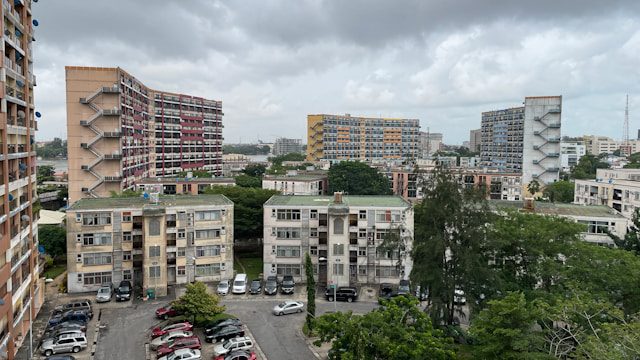Now more than ever, reviving the Nigerian dream is crucial as the “JAPA” syndrome is a nation-wide issue paralysing practically every sector all around. Many fantasise of leaving the nation in quest of greater possibilities somewhere else.
Many times, this way of thinking leads to a lack of commitment to local initiatives since young people view them as stepping stones rather than long-term investments.
Since Nigerian young people woke the national awareness in 2020, Japa’ a Yoruba word meaning “to run” or “to flee” has become a common lexicon for them. Drawing on casting migration as a metaphor for “fleeing,” suggests that survival depends on it.
This post analyses the political, economic, and social configurations that weave urgency through the social-cultural phenomena of japa by means of a series of interviews with Nigerian young people who are either preparing to leave or have left the nation as education migrants.
Among the issues noted are poor government, unemployment, insecurity that has turned into terrorism, banditry, kidnapping for payback, bad working conditions, constant strikes in tertiary education all of which undermine Nigeria’s aspirations for development.
Apart from addressing JAPA syndrome’s issues, it was advised that the government should get ready by strengthening the national economy by means of employment possibilities and by supporting entrepreneurship by means of loans with low interest rates to eager businesspeople.
The government should increase national security to inspire investors and knowledge to grow the national economy. By offering infrastructure facilities and creating the working atmosphere fit for the employees, one can help to reduce brain-drain among other things.
Reasons for Leaving Nigeria
Almost tripling from 1990 to 2020, the explosion in Nigerians living overseas illustrates a changing trend whereby more people are looking for a life abroad. Here are some major factors driving this move:

1. Economic Equality and Monetary Stability
People’s perspective on living in Europe is primarily shaped by the situation of Nigerian economy. The Nigerian Naira’s fluctuations aggravate financial problems; so, stability of the Euro and other stable foreign currencies appeals to them and influences their financial goals.
According to World Bank estimates on the 2023 Nigeria Update, about half of Nigerians live below the national poverty threshold. Apart from the financial problems, 104 million individuals are estimated to be underprivileged.
The possible food insecurity issue afflicting 19.4 million Nigerians emphasizes the need to look for possibilities overseas, where there is better pay, and better living conditions become strong motivators.
2. Unemployment
Nigerian Bureau of Statistics (NBS) made it known that in Q2 2023 unemployment was at 4.2%., However, this has gone even higher as at the last quarter. Unfortunately, these numbers do not tell us much about what is really happening. Using the adjusted definition of employment adopted by the International Labour Organisation (ILO), the unemployment rates plummeted from 33.3% (Q4 2020) up to 5.3% by the end of Q4 2022. Inclusion of underemployment as part of unemployment.
This revised approach allows for a more accurate understanding of the job market by distinguishing between underemployment and unemployment. Better sample methods and monitoring the quality of the data are other new ways to achieve this while removing sub-sustenance agriculture employees; thus justifying the new unemployment level in terms of The average rates for these regions in 2022 were at about €4.7%.”
While the rate of youth unemployment in Nigeria increased from 6.9% to 7.2% in Q1 2023, most of the younger Nigerians have not seen what they expected to happen coming into reality. But despite those figures, they consider outside growth opportunities at individual level as well as advancing their careers. Europe offers relatively high employment rates and shortage of skilled labor.
Reflecting a global trend of migration for improved employment, many Nigerians are grabbing the chance. Apart from personal goals, the fight for meaningful jobs affects families’ and communities’ financial situations, so work abroad becomes more and more attractive.
3. Education
Many Nigerians decide to travel to Europe in search of chances to learn and grow personally.
The United Kingdom is the preferred country for Nigerian students among the many European countries. Nigerian students are attracted to the UK due to its reputable universities, programs initiated by local communities, as well as globally accepted teaching methodologies.
Their inclination for the UK is because they believe it offers top-notch education and creates opportunities for unambiguous career paths. But a recent legislative change has made it harder for Nigerian students to make decisions in the UK.
Since January 1, 2020 the students in UK from other countries are prohibited to move with their family under the student visa. This however does not apply to higher education (PhD) students who conduct research.
Nevertheless, Nigerians are looking for alternative routes that would match their learning and lifestyle goals in spite of this situation that still finds the United Kingdom attractive.
Some searchers consider countries where they may receive help with immigration policies, be able to learn at good schools and find themselves suitable jobs possible. This dynamic situation highlights how versatile and strong Nigerian students are in adjusting changes in foreign education policy.

4. Values That Focus On The Family And Remittances
High consideration of family values by Nigerians strongly affects their tendency to migrate. The substantial amount of annual remittances valued at $ around 20 billion signifies concern for relatives’ lives. Household improvement and meeting different needs such as housing units or feeding bill, kids’ tuition fees, healthcare services or even electricity bills, among others, can only be done via these remittances.
5. The Current Security Situation
Relying on data from the International Trade Administration (ITA), Nigeria stands at position 143 out of 163 countries in the 2022 Global Peace Index; nevertheless, its major security threats that support such concerns also contribute to the attraction for Europe as a region of peace and a safe haven.
The disturbing terrorism index which is being propelled by entities such as Boko Haram and ISWAP with incidents of communal clashes taking place alongside kidnapping cases paint a gloomy picture in this West African country therefore negating the optimism connected to having an environment devoid of violent activities for its people who still hope amidst all odds.
6. Political and Financial Turbulence
There were serious contestations in the Nigerian election held in February 2023. The electoral body failed to quickly transmit results from voting sites leading to complaints of manipulation and rigging.
Despite his election as president of Nigeria, there is a demand by those opposed to President Bola Tinubu through their different organizations of another election. Moreover there is strain in Nigeria’s economy.
7. Economic Uncertainty
With a 43% Youth unemployment in Nigeria, the youthful population suffers among the worst from the economic problems of the country. If individuals affected want to register at university and get the qualifications needed to stand out in a saturated employment market, it is difficult to do so at home.
The most often used countries in Africa have fast growing student-age populations. By assessing a recent British Council analysis, the steady increase in advents admissibility at Nigerian colleges compared to foreign institutions has immensely led to few slots available for competition.
Even though Nigeria is interested in admitting as many foreign undergraduates as possible, it does not mean that equal opportunities are provided due to cheap labor abroad and scarce salaries at home. Additionally, according to a recent British Council analysis, the escalating preference for overseas schools especially in Nigeria over its institutions has given rise to competition for limited admission chances.
Moreover, as the number of immigrants waiting to get an education increases, many of them prefer degrees from abroad from wherever, except Nigeria. In as much as they want to attract non-citizens, some governments do not grant equal opportunities because these individuals will work for low wages abroad. While others stay unemployed at home because of the high prices or there are no vacancies abroad.
Companies providing relocation to other African cities such Nairobi, Accra, and Johannesburg are highly sought after as European learning hubs are starting to get active.
8. Living Quality
Things like unstable energy, bad roads, and limited access to basic infrastructure cause many Nigerians to have worse quality of living.
Some Nigerians want to migrate to countries with better infrastructure and services so they could raise their quality of living.
9. Social Injustice and Discrimination
Great numbers of social injustices based on race, religion, or socioeconomic class abound in Nigeria.
Some Nigerians find it difficult to obtain equal rights and opportunities in their own country, so they could look for a more friendly community overseas.
10. Worldwide Citizenship
As globalisation continues and the world is more integrated, some Nigerians want to be global citizens and look for opportunities beyond their own country.
Becoming citizens of another country appeals to them since they want to see more and grab more opportunities.
By 2024, Nigerian passports score not very highly as compared to those of numerous other countries. Many times, persons having a Nigerian passport have limited options for visa-free travel or visa-on-arrival to many other nations.
Giving up Nigerian citizenship or seeking citizenship in another country is a profoundly personal choice impacted by many political, social, financial, and personal elements generally.
Many Nigerians living abroad keep strong ties to their own country by attending cultural events, sponsoring local businesses, and helping development projects even if they live far from Nigeria.

This link reveals how powerful and committed Nigerians are to do well and change the world wherever they live.
11. Inadequate Human Capital Development
Nigeria’s investment in human development has been nothing spectacular for many years, now that its budgeted 7% commitment to education is less than average
UNDP claims that low investments in education are the reason behind the country’s HDI drop by three points down to 161 out of 189 countries as against 158 last year.
It is obvious that countries such as Qatar, Saudi Arabia, Canada and many others that are serious about investing in people’s advancement are enjoying high GNI per capita as well as minimum levels of unemployment together with speedy economic advancement.
Economic and Social Consequences of the Japa Syndrome
1. Brain Drain
This departure leads to a decrease in the workforce in the country and slows down its economic improvement. Though not a new idea, brain drain means more to today’s Nigeria compared to the past times when it was just a common place thing.
What is certain for instance are costs of training and education that these experts have undergone at the expense of Nigerian tax payers only to go and benefit other countries with better pay, better working conditions among others.
A lack of qualified and experienced professionals so affects our healthcare system, educational sector, and other important sector. Dealing with this problem calls for a multifarious strategy including incentives to keep talent, better working conditions, and an atmosphere encouraging professional development and creativity.
2. Loss of Confidence of Investors
The widespread migration of Nigerians also signals negatively to possible international investors. They could be deterred from making investments in a nation thought to be losing its trained workforce and running out of qualified experts.
The economic progress of any country depends on the faith of its investors. Foreign investors hesitate to invest in Nigeria because they see it as a nation losing its human capital and suffering a talent exodus. Reduced foreign direct investments over several years have already shown to limit job creation possibilities in our country and impede economic development.
Western industrial powerhouses outsource most of their manufacturing and associated economic operations to Asia and Asia in general not just because they have a workforce but also because they have a trained workforce.
Nigeria has to show her dedication to keeping and growing our qualified workforce if she is to recover investor trust. This addresses the brain drain problem as well as enhances general corporate environment, openness, and governance.
3. Low Economic Productivity
Countries always suffer reduced economic productivity when a sizable fraction of the productive population leaves since experienced and skilled hands are rare and less workers help manufacturing and other sectors of the economy.
The prosperity of any country depends mostly on its economic output. Skilled people leaving the nation leave behind industries including healthcare, technology, engineering, and education lacking experience. This affects the whole economy in addition to impeding advances particular to sectors.
The Nigerian government has to give policies encouraging innovation, entrepreneurship, and investment in important areas top priority if it is to raise economic productivity. Moreover, building an environment that supports companies (especially startups) and promoting Nigerian heritage will help to stimulate employment and diversification of the economy.

Mass migration phenomena can lead to unfavorable view on Nigeria as a nation. Such phenomena may buttress the pre-conceived idea that Nigerians have to leave their own country in order to have any chance for a better life.
Globally, perception is quite important. A decline in foreign investment and a damage to diplomatic ties can follow from the international community’s view of Nigeria as a nation unable of keeping its trained personnel.
By highlighting the achievements of Nigerians who have stayed in their nation and made major contributions to its development, one might help to refute these negative impressions. Emphasising the potential and successes of the country would help the Country dispel preconceptions and rewrite the story of Nigeria.
4. Increasing Medical Mistakes and Deaths
The possible consequence of losing experienced personnel in essential fields like health care could possibly be that medical mistakes would go up leading to probably death. There are many disadvantages of Japa Syndrome among which lack of enough numbers of workers in the health sector is one them.
When they leave the service, expert doctors, nurses and other health attendants may reduce the quality of service that will result in cases of diseases and subsequent deaths that would have been averted if they were there.
The initial area that the government should look into as a matter of urgency should be the health sector where it will offer attractive salaries, better working locations, as well as chances for further training.
5. Decline in Gross Revenue
Loss of income is another result of mass migration on the economy. Particularly among those of working age, citizens’ migration has resulted in lower tax collections and lower consumer expenditure. This has been aggravating the government’s capacity to provide the people with necessary services and has been driving budget deficit.
6. Vulnerability to Trafficking and Exploitation
People who have their kids trafficked for child labor are sometimes forced to go having other kids so that their expenses can be met with the hopes that even if the children go abroad, they can send money to them. Italy has at least 120,000 Nigerians on its territory, the second largest group of Nigerians in Europe (after the UK), and the most significant place for Nigerian victims of trafficking according to a 2022 population estimate by the Mixed Migration Centre.
Of the 18,000 Nigerian migrants reported to have arrived into Europe across the Mediterranean in 2017, 5,400 of them were women (UNHCR, 2018). The International Organisation for Migration (IOM) also noted an almost 600% rise in the number of possible sex trafficking victims arriving in Italy via the Mediterranean between 2014 and 2016.
Potential Solutions to Address the Root Causes of the Japa Syndrome
The government has to act forcefully to stop Japa syndrome and seize Nigeria’s great potential. These here are some ideas.
- Restructure the educational system such that it meets world needs. Give practical skills-based education, entrepreneurship training and industry-academia alliances top priority. This will arm graduates with required competencies.
- Invest in dependable power transportation and healthcare. Provide reasonably priced homes to create atmosphere that will help companies. This will improve the general quality of living.
- Strong institutions, fight corruption, advance the rule of law, guarantee openness and responsibility at all governmental levels.
- Launch focused initiatives providing grants and mentoring possibilities. Give cheap loans.
- Give out business training to young Nigerians so that they may realize local opportunities. Worker mobility is caused by several factors whose solutions are complex and requires intervention by government. This challenge results from lack of economic possibilities notably brought about by unemployment. This problem may be addressed by policies aimed at enhancing job creation as well as economic growth. Employees should be prepared with relevant skills. Moreover, they should be trained on how to improve their employability.
- Companies supporting projects for training and development can assist produce a workforce with knowledge and expertise. You really must invest in these areas. Initiatives to teach current employees. Key to doing this are initiatives to draw in and keep new employees.
- Technology Investments to Increase Automation and Efficiency: Businesses can make technological investments to increase efficiency and automation.
- This can enable companies to lessen their reliance on human work. It can make them more profitable and efficient. At Descasio we provide automated solutions companies may use to slow down Japa-related labour losses.
- Businesses can also create alliances and joint ventures to distribute resources and knowledge by means of other companies. This can involve distributing recruitment and training resources. Additionally companies should work on research and development initiatives. This will provide fresh goods and services.
- Promote remote working: This helps lessen the effects of labor migration. Thanks to technological development. Companies can have staff members operate remotely even across international borders.
- The government should offer incentives to qualified experts. This would encourage them to stay in their native nation. To entice experts to remain in Nigeria this could include grants tax deductions and other financial incentives.

The Importance of Building a Brighter Future for Nigeria
Most arguments on Nigeria nowadays ignore the outstanding economic record the nation has produced over the past 10 years. A new year-long study by the McKinsey Global Institute (MGI) indicates that over the next 15 years Nigeria might rank among the top economies in the world.
On the continent of Africa, Nigeria boasts of a large population- regarding the number of people, it has the highest number of people. The number of people in it are two hundred million people. It has only recently been established that it has the biggest economy in any African country, with its G.D.P. having risen to $510 billion last year– the 26th highest worldwide- after some “rebasing” data was revealed to that effect. Nigeria possesses the largest population in Africa, with 200 million people.
According to MGI, Nigeria may even make it to be one of the top twenty countries in the world, with an estimated annual Gross Domestic Product (GDP) of over one point six ($1.6) trillion and annual economic growth exceeding six per cent (6%).Moreover, if Nigerian government guarantees inclusive development, about thirty million people might be pulled from poverty.
The problem is that, especially among foreign companies and investors, Nigeria still suffers from out-of-date assumptions that restrict its possibilities. Many, for example, consider Nigeria as a petro-economy depending on the world oil market. Although exports and oil output remain main sources of income, the resources sector accounts just 14% of GDP. Thus, the Nigerian economy is significantly more diverse than many would have us realise.
Another related myth is that Nigeria’s economic development is erratic, with annual performance swings of great variance. Nigeria has become more economically and financially stable as it has diversified its economy and disconnected public spending plans from current oil prices (part of a 2004 budget reform). Indeed, GDP has expanded by 6-7% in recent years (2010-13, in “rebased” terms), more from increasing productivity than from favourable demographics.
At last, there is a broad misreading of the development of the Nigerian economy. Although practically all sectors outside of the resources sector have poor (albeit improving) productivity and widespread poverty, Nigeria has a fast-expanding consumer class that will become increasingly significant in driving development.
At least 160 million people who earn at least $7,500 annual income will become potential customers for over 34 million households by the year 2030. The presence of international consumer goods manufacturers and sellers could raise this figure from its current level of $388 million annually to $1.4 trillion.
Nigeria’s geographical location helps it even more, enabling it to profit from rising demand throughout Africa and other developing nations. Add to that a large and growing population and entrepreneurial energy; the future seems bright.
If Nigeria’s government is to release this potential and ensure that the next decade of development brings significant declines in poverty, it must implement reforms to boost productivity, improve wages, and more effectively supply basic services such health care and education.
In the agricultural sector, for example, the government may encourage the change to more profitable crops, improve the use of fertiliser and mechanised tools, and advocate land title reform to open additional farmland without deforestation. Better distribution and marketing would also enable farmers to keep more of their product sales.
In metropolitan areas, productivity suffers from a significant degree of unofficial employment—sometimes even in large companies. This robs the economy of the vibrancy competitive small and medium-sized businesses create and maintains too many Nigerians in low-skill, low-paying jobs. The explosion of internet companies in Nigeria indicates that the skills are present; thus, using Nigeria’s diaspora would help to expand that pool of talent.

Frequently Asked Questions
1. Where Do Nigerians Emigrate The Most?
The United States has the highest number of emigrants followed by the United Kingdom according to the 2024 World Migration Report.
2. Why Are So Many Nigerians Emigrating?
Emigration’s inspiration mostly comes from socioeconomic concerns including conflict, insecurity, economic instability, and civic disturbance.
3. What Are The Causes of Japa In Nigeria?
Political uncertainty as well as economic instability, insufficient infrastructure, insecurity heightened and limited accessibility to both education that is of good quality & health services are some of the factors that cause the disillusionment of young people. Regarding the future, particularly for young Nigerians, there is a degree of ambiguity.
4. What Is The Japa Syndrome In Nigeria?
High disenchantment can cause low interest among young people. The Jap Syndrome is attributed to political instability, poor economic development, poor infrastructure, the lack of security and the restriction to get quality education and health.
5. How May Mass Exodus In Nigeria Be Lessened?
Several steps can be done to either increase or lower the mass flight of professionals in order to solve the “japa syndrome” and its effects on Nigerian education. First, the government has to give the development of policies and projects aiming at job creation, fair pay, and better working conditions top importance.
6. Is it Possible To Stop The Japa Syndrome In Nigeria?
Apart from addressing JAPA syndrome’s issues, it was advised that the government should get ready by enhancing the national economy by means of employment possibilities and by supporting entrepreneurship by means of loans with low interest rates to eager business owners.

Final Words
Together with assistance organisations and the private sector, the government of Nigeria will also need to simplify procedures for registering and running a legal firm to make doing business in Nigeria easier. This would help to boost infrastructure investment. It will also have to sharpen its fight against pervasive corruption, which taxes every company.
Nigeria need to provide more to the public so that everyone is included else violence, deaths and increased poverty will continue from time to time. Firm dedication from Nigeria’s leaders would ensure provision of support, ranging from seed subsidies to immunization to individuals in need, regardless of their location within the state.
Nigerians do not require global community compassion or even anger. Their need is encouragement and support. Nigeria can only free itself from the grip of violent forces like Boko Haram and provide its people with the security and wealth they so deserve using steady and inclusive development.


